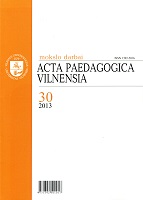UGDANTIS PATYRIMAS J. DEWEY FILOSOFIJOJE
EDUCATIVE EXPERIENCE IN JOHN DEWEY’S PHILOSOPHY
Author(s): Sandra KairėSubject(s): Essay|Book Review |Scientific Life
Published by: Vilniaus Universiteto Leidykla
Keywords: ugdantis patyrimas1; veikla2; refleksija3; sąveika4; tęstinumas5; ugdytojas6;
Summary/Abstract: Educative experience is the most important concept in J. Dewey’s philosophy. Even Although J. Dewey formulated his ideas in the beginning of the 20th century, they are still being widely discussed nowadays. However, in Lithuania, J. Dewey’s ideas are little analysed (Valatkienė, Aškinytė, Cibulskienė, Duoblienė) in the context of education. Therefore, the aim of this article is to highlight the theoretical foundations of teaching / learning through experience based on J. Dewey’s philosophy. The article states that J. Dewey’s educative experience includes these principles: interaction and continuity, and these elements: action and reflection. Interaction between a child and the environment is the starting point of educative experience. The interaction happens in a continuous action which leads to the problem-oriented situation. The problem works as a stimulus for reflection. Within reflection, a child discovers the connection between action and consequence, solves the problem and gains new knowledge and skills. According to these notions, educative experience can be defined as a connection between doing and undergoing. This kind of connection depends on the situation and the previous experience and also influences the quality of future experience. J. Dewey did not present a model of learning process through experience. Thus, this article analyses the models proposed by D. Kolb (1984) and R. Miettinen (2010). Analysis of these models shows that R. Miettinen’s model more accurately reveals the learning process based on J. Dewey’s philosophy, although this article does not claim that the model of D. Kolb or other models are misleading. Learning through experience depends not only on the philosophy of education or its theoretical background. According to J. Dewey, the teacher’s role is pivotal, because the success of a particular learning process and its results lie in teacher’s creativity and ability to take full responsibility for it. Key words: educative experience, action, reflec¬tion, interaction, teacher.
Journal: Acta Paedagogica Vilnensia
- Issue Year: 2013
- Issue No: 30
- Page Range: 34-46
- Page Count: 13
- Language: Lithuanian

